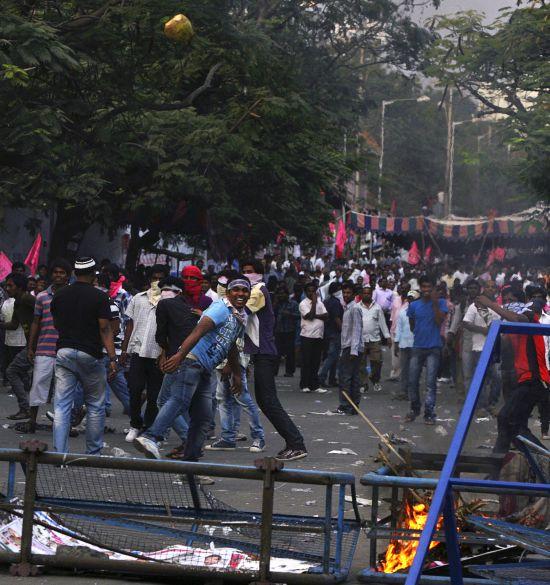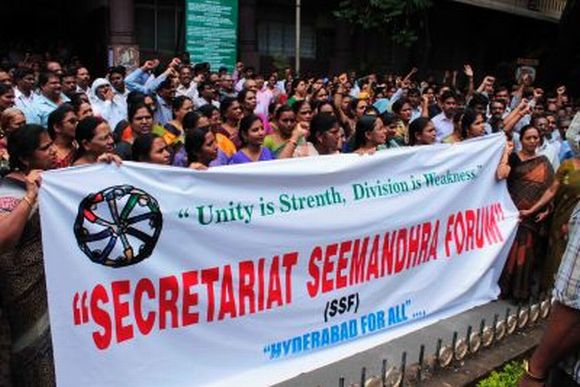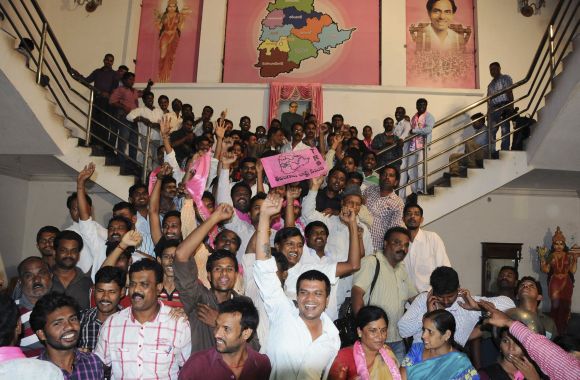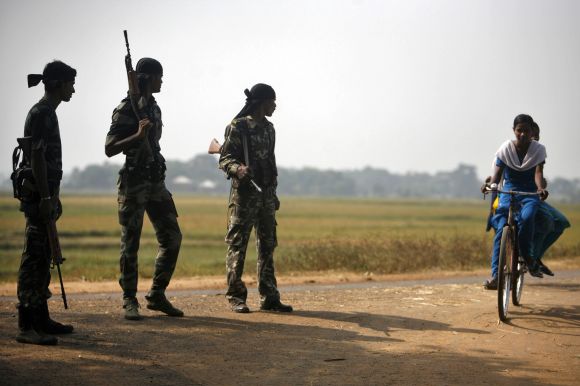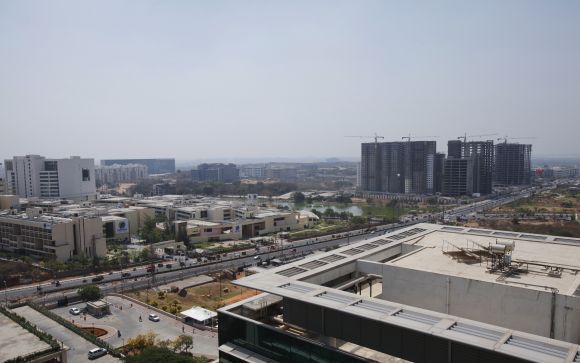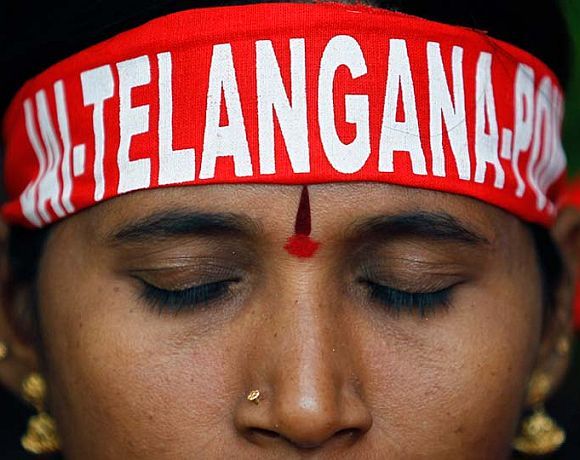 | « Back to article | Print this article |
'Telangana must not become a prisoner of provincialism, xenophobia, strife'
'Violence will come when you start getting into the business of what are you doing about Hyderabad, what are you doing about protecting the investments of those who are non-Telangana in the greater Hyderabad region,' warns thinker Harsh Sethi.
Harsh Sethi, the consulting editor of the respected Seminar magazine, is one of India's important thought leaders, a lucid and sharp commentator on human rights, development and issues related to politics and nation building.
Sethi spoke to Rediff.com’s Sheela Bhatt in a rare two-part interview on the fallout of a possible Telangana state.
Part 1: 'The division of Andhra will lead to a period of turbulence'
You have been a keen observer of the Congress party for many years.
If you take a panoramic view of the Congress’s policies and thinking processes, how do you see the way Sonia Gandhi and Rahul Gandhi have taken the Telangana decision?
The decision by the Congress high command -- whether taken by only the Gandhis or the Congress Working Committee -- is being done with the perception of what electoral benefits they might reap.
Or rather their perception that the creation of a Telangana state -- at least in the areas of Telangana -- will help them to be seen as the party having granted the state.
So the fear is two-fold, or the argument is a two-fold one.
If we do it, we are the ones who get the benefit; second, if we don’t do it and it is done later, then others are going to gain the benefits.
In both cases, the perception is that the creation of a state leads to electoral dividends.
Please remember that in Uttarakhand, the group which most fervently and for the longest period of time championed the cause of the new state got electorally wiped out.
There is no necessary causal argument that you can put out. That by taking a certain step or by proposing a range of measures, you are going to get electoral benefits. That’s the first.
The second is that for a party like the Congress, which not only has a long and glorious history, but also has been ruling the country, to take a decision purely or primarily on the basis of electoral expediency does not speak particularly well (of it).
It shows poorly how it perceives complicated problems like the drawing of internal boundaries.
In Telangana there are a number of rival claimants. The Telangana Rashtra Samiti and also the Bharatiya Janata Party, the Communist Party of India, etc. So who will actually garner the potential benefit from the creation of a new state is not as clear.
And if everybody claims to be the father of the new state, the number of seats in Telangana will not get bunched for any one party.
Please click NEXT to read further…
'Telangana decision will have an impact beyond the region'
Will the decision have any national impact?
It will have an impact in the regions which have seen a somewhat active agitation for the creation of a new state, whether it be Vidarbha or Gorkhaland, two of the most obvious examples.
Harit Pradesh has not had that strong a demand, but I am sure various politicians would jump into the picture and Ajit Singh would say why not give them Harit Pradesh or whatever else.
If you get enough mobilisation -- which you can structure around -- then even Kutch can say give us a separate state.
But to go back to my first argument; there was some logic, whether we agree with that logic or not, which went behind the creation of the states that we currently have, with the first states re-organisation.
Language was given primary importance along with what the economic centres are… all states were multi-lingual and will necessarily be multi-lingual.
In India, all states are multi-ethnic and will necessarily be multi-ethnic.
As long as you have a size of certain variety, your population distribution is going to get people of all varieties.
If you overplay one identity concern in a major way, you always create the possible problem of those who do not belong to the favoured group feeling discriminated against, feeling like second citizens, feeling that they do not get adequate representation.
Then every one of our policies -- not only in terms of who will get economic advantages, who will get licenses, what will you do with schools, what will be the language of communication and instruction, what will be the language in the courts -- then becomes increasingly intractable.
It is clear you are not citing good enough reasons for the creation of Telangana.
Can you tell us how things will move once such a state is created?
I am not saying create or do not create a new state.
In a certain sense, I am saying decisions get taken, not only because of a logic of potential good, but because social pressures and tendencies will push you to a certain direction.
At that stage, we need to think in terms of the second order political alternatives.
For whatever set of reasons there has been a long standing demand and an agitation and the demand becomes -- to use the favourite political expression -- unstoppable, then the name of the game is to see how well you can manage the transition.
My fear is not that there will be a state or not, whether it will have this boundary or that boundary, and what final decision you will take with respect to Hyderabad, whether it will be a Union territory, whether it will be a joint capital for x number of years or whether it will be exclusively given to state A or state B.
My argument is that the other equally critical and important task, not only before the Congress, but before every political party, is to prepare and educate people in terms of both how to manage the transition and how to manage the post-division states such that the two states or three states or whatever might come into being do not become a prisoner of internal provincialism, xenophobia and strife.
In which case, all we will manage to do is to displace one set of problems with another set of problems, all of which continue to have the same kind of social impact that existed before the creation of the new states.
Please click NEXT to read further…
'The real sticking point is Hyderabad'
The creation of Uttarakhand, Chhattisgarh and Jharkhand had been smooth, relatively speaking.
The way it was done, it was not big news the way Telangana has become.
What is different now?
In the case of Andhra Pradesh, the real sticking point is Hyderabad.
It is seen as the largest revenue generator. It is seen as the place which has attracted the maximum amount of national capital.
There are investments of everyone there. There is a huge amount of public sector investment, which were there in Hyderabad even before it became a real estate city.
Preparing any other city to take on the same kind of role -- whether we are talking in terms of coastal Andhra or Vijayawada or whatever else -- is a big agenda.
If Rayalaseema is also granted -- some kind of a separate entity and because there are episodic noises saying that Rayalaseema does not want to merge with either one or the other; they claim they were always separate -- then you are going to have that particular kind of problem.
This problem was not as marked in Madhya Pradesh where you had Raipur as a reasonably developed regional centre.
Now when you gave Raipur as a capital and got power concentrated there, does it necessary lead to larger tribal representation which is the basis on which you make the decision is an open question.
Similarly, remember that Jharkhand had not only the forests, it has Ranchi, it had Jamshedpur, there was industry, there were mines, and again the question remains that the politics might be dominated by tribal legislators, but the manner in which the economy functions does not necessarily work to the benefit of its tribal population in whose name we created a separate state and therefore the argument in Jharkhand consistently is, yes we were given Jharkhand, but we were given a truncated Jharkhand.
They say we want more districts out of Orissa, we want some districts out of West Bengal, there should be a larger Jharkhand.
Also, please let us never forget that even in a state like Jharkhand, the non-tribals are as much if not a little more than the number of tribals, so it is not a tribal-dominated state.
And there are constant problems between tribal group A and tribal group B, not only in terms of tribes, but unfortunately in terms of their religious conviction.
So you start getting a distinction between Hindu tribes and Christian tribes.
Or even within the tribes those groups which may have chosen Christianity over Hinduism or vice versa. And you have all those conflicts which become much sharper when dominant politics is dominated by concerns of identity.
And if all economic and social and cultural deprivation is related to issues of identity as a primary concern, I think all we can say is that 60 years of democratic and republican politics has -- if you don’t want to use strong words like failed -- insufficiently managed to create the notion of a citizen.
Please click NEXT to read further…
'Learn how to manage transitions'
What will Telangana look like?
What kind of an identity will it have?
I am still unclear about the status of Hyderabad.
The little that I know about the region as a non-Telugu and a non-Andhra person, is that in these 60 years, they have not addressed the one primary cause of their backwardness, which is improving the state of agriculture.
They have done very little about irrigation, they have done very little about land relations in rural Andhra and those problems continue.
Similarly, you have all kinds of problems with what was seen as the agency areas in what is Telangana, which are the forest areas, which were then supposed to be the hotbed of Naxalism.
Now that problem remains the same as it was when the state of Andhra Pradesh was created.
Internally, given its history and harking back to the Nizam’s rule, there is this equally complicated and conscientious issue of Hindu-Muslim relations, which expresses itself more sharply in the cities, but is not absent in the rural areas.
So what does it mean to the nature of social politics as it will develop in the state of Andhra and the state of Telangana?
Will it lead to Muslim consolidation? Will it lead to aggressive Hindu politics?
Remember, Hyderabad for a phase in the 1980s and the early 1990s saw a spate of communal clashes and tensions.
These have come down because of the nature of economic progress that the city of Hyderabad has seen.
And the ability of large chunks of Muslim groups -- through education and skill -- to seek employment opportunities not only in the growing complex of larger Hyderabad, but also outside the country.
Even the MIM (Majlis-e-Ittehad-ul Muslimeen) as a Muslim party, unless pushed to the wall, no longer raises issues like the Uniform Civil Code or the status of the Aligarh Muslim University or fight about exclusively Muslim issues.
It is far more involved in ensuring its clientele -- which are the Muslims of the walled city of Hyderabad -- improve their education or skills.
It is an extremely significant point that the growth of the computer industry in Hyderabad resulted in 20 to 25 percent Muslim girls working in the industry.
And the debate in the Urdu press in Hyderabad is how important it is for girls to continue to wear the burkha. All these developments within which people are moving out from one particular kind of world and engaging with another can get a setback if a more divisive identity-based politics starts becoming somewhat more prominent.
I am saying this is not to say do not give a state, but it is to say that please turn your attention to other critical issues and learn how to manage transitions.
How to ensure that democracy deepens, how to ensure that this notion of internal divisions do not get excavated and how we can help the process of the creation of republican citizens in which the others are not seen as the enemy. That is what is critical.
And if you are able to do that in the state of Telangana -- and I am saying whether you do it there or do it as a part of a larger thing at the national level, is the moot point.
Please click NEXT to read further…
'Overstated Naxal fear in Telangana'
Do you think Marxist-Leninist ideology can return to the region?
Do you think, as some people claim, that it is a victory for the Naxalites because they were early in demanding a Telangana state?
Do you see any kind of ultra-Left ideology behind the Telangana demand?
Personally, if you ask me, I don’t.
These are all overstated fears. When debates become harsh and are put in stark and simplistic terms, then each of these fears is worked out.
The fear of Balkanisation is one kind of fear, the fear that in the smaller state, the ultra-Left tendency, which is important in that particular region, will become even more important, therefore there are issues with national security or internal security etc, I think these are all over-stated.
These are stated by interested political people and we tend to overstate our case to weaken the other.
The name of the game is that if you have a Naxalite problem or a Maoist problem there, you have to learn how to handle it.
Do you think Sonia Gandhi will get credit as the mother of Telangana?
That’s the way this spin will be worked out, that finally because as far as the Congress is concerned, if the fallout is positive, of any particular decision, then the credit for the fallout goes, always, to the high command.
If the fallout turns out to be negative, it is then sought to be distanced from the high command and they seek other possible elements to blame.
That has been unfortunately the most undesirable qualities of the Congress.
Do you see the possibility of violence in Andhra?
Of course.
Please click NEXT to read further…
'Real fears over investments'
Is popular sentiment against Telangana widespread?
I am not saying widespread, but I am saying that the violence will come when you start getting into the business of what are you doing about Hyderabad, what are you doing about protecting the investments of those who are non-Telangana in the greater Hyderabad region.
Remember all the big industrialists, all the big builders come from other regions. Thus, they are constantly opposed because they are scared of whether their investments will be protected.
Finally, please do not forget that when united Andhra was made out by taking away parts of Tamil Nadu and taking away parts of Karnataka and making it into a larger Telugu state, the people in Telangana, claiming educational backwardness, sought a range of reservations, particularly in government jobs.
Their consistent complaint is that this understanding was never implemented nor was the demand that there would be a chief minister or deputy chief minister from the region and that if the chief minister comes from the coastal region, then the deputy must come from this region etc.
There was some understanding of whatever is called political power sharing.
Now the political power sharing has got to do with the leaders. It has nothing to do with the common people.
But if, for instance, we start favouring one set of people in the name of long-term deprivation for jobs in government or for giving out government contracts, or for whose industries you will favour or not favour, I am saying that other people who have looked at Hyderabad as a site to go to and prosper are going to feel somewhat incensed and leaders or important people who have lost out on their investment will use that resentment and fuel up problems.
So it’s not that if am living in Vijayawada, it makes a particular difference to me whether the state of Telangana is created or not, but you can be told that because of this, all the major educational institutes are now in Telangana, because they are all around the Hyderabad region and your chances of admission to the central university or whatever, has gone down because there is now a new quota.
Why has Bihar and Uttar Pradesh never felt the pain the way Andhra Pradesh is feeling?
In Bihar, they resisted this for a long period of time. As far as UP is concerned, halving off the hill areas hardly created a problem for them. It was small in numbers.
Except that you lose out on small pilgrimage sites and potential revenue or where you might have a holiday home. That was not the fight. The fight was over the Terai region, the fight was over the district of Hardwar.
That’s where the money was located and please remember that that was a fairly intense fight.
For Bihar, the issue was revenue loss because of the mines and the resources.
At the end of it, what happens to be Bihar now is an agricultural state.
You have created a new state of Jharkhand, but the state of Bihar, which in the 1950s was supposed to a well-run, efficient state, is still complaining and constantly wants the status of most deprived state and therefore larger central revenues.
So it is not that these were without problems.
Please click NEXT to read further…
'What will be good for Telangana is good politics'
By the same logic, if the state of Gorkhaland is created, why do you perceive that there is a problem in West Bengal?
Is it only to do with a new state? With politics?
With numbers in each assembly and which party gets it?
Is it to do with the Gorkhas?
They will only be better off if the transition is handled in a certain way so that the Gorkhas do not become unwelcome in other parts.
What will be good for Telangana?
What will be good for Telangana is good politics.
That is not just a question of whether you make Telangana or whether you don’t or put in this district or that.
Those things will be fought over and that is fine.
What is important is to see is the manner of transition.
It is what is going to influence the nature of the future running of a new state.
TOP photo features of the week
Click on MORE to see another set of PHOTO features...
